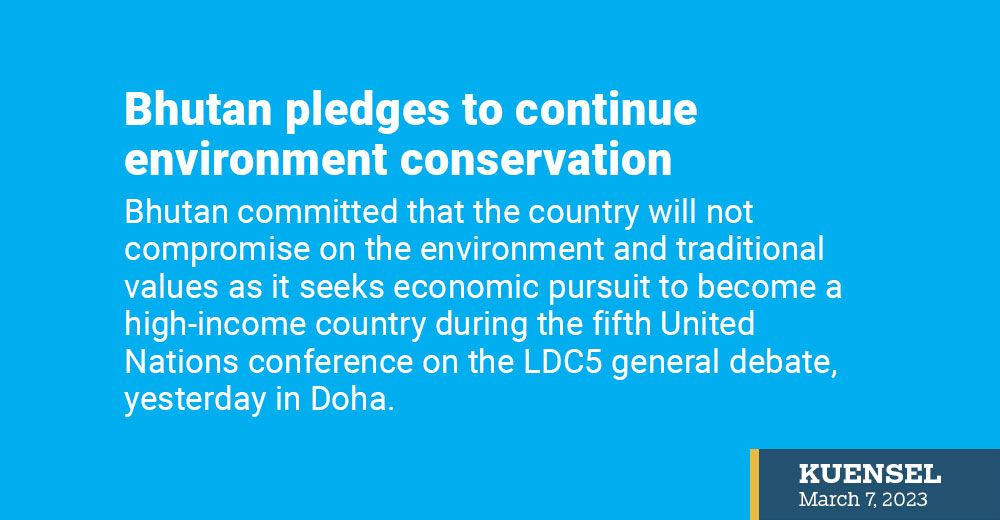Dechen Dolkar | Doha
Bhutan committed that the country will not compromise on the environment and traditional values as it seeks economic pursuit to become a high-income country during the fifth United Nations conference on the LDC5 general debate, yesterday in Doha.
Prime Minister Dr Lotay Tshering said that the country wants to make sure that as it works towards becoming a high-income country it will adhere to the development philosophy of Gross National Happiness.
Bhutan is scheduled to graduate from the LDC category by the end of this year.
Lyonchhen said that in order to do so, Bhutan will continue to look to partners, the member states, United Nations (UN) system, multilateral development banks, international financial institutions and other international networks to work together.
“Bhutan’s needs are specific and unique, so we turn towards the UN platform to redesign the formula of assistance that is accurate and effective,” he said.
Lyonchhen said that this conference comes at a special time for Bhutan. “We are gearing to graduate from the LDC category this year.”
Lyonchhen said that Bhutan’s transformation initiatives are the ultimate runway that will propel it to sustainable graduation from LDC, as well as in securing lasting progress and economic stability.
“We look forward to the UN and its specialized agencies, to dive deeper into such unique challenges and also see how the Doha programme of action will be relevant to Bhutan, after graduation,” Lyonchhen said.
Lyonchhen said that climate change remains the single biggest threat to sustainable development and the LDCs bear a disproportionate brunt of its impact
The rapid melting of Himalayan glaciers, flash floods and other extreme weather events are increasingly threatening Bhutanese vital infrastructure and livelihoods. Every second day, there are news of floods and landslides in the region.
“We feel even more insecure because we don’t have the means to adapt to such disasters,” Lyonchhen said.
Lyonchhen said that Bhutanese are witnessing one of the highest food inflation ever in recent history. Lending rates in advanced countries have gone up in order to curtail inflation. “In the process, what happens to those countries that are finding it difficult to service their debt? What about millions more who are pushed into extreme hunger?,” he said.
The fact that more developed countries diverting significant amounts to their defense systems, he said, would take away resources that could otherwise be invested in healthcare, education, food and nutrition of the developing countries. “If we focused on such investments, I feel that would be the most rewarding battle ever won for all mankind.”
Lyonchhen said that for all LDCs, the focus should be in deriving the potential of science, technology and innovation, especially digital technologies to leapfrog towards new goals. “But to implement new ideas, we need funds, which is what we lack.”
He thanked the State of Qatar for committing USD 60M fund to the LDCs.
Since the onset of the pandemic, the 46 countries in the LDC category have suffered through inadequate pandemic-fighting resources and spiralling debt, sending their development progress backwards.
Many leaders gave an example of Bhutan being carbon neutral due their statement.


